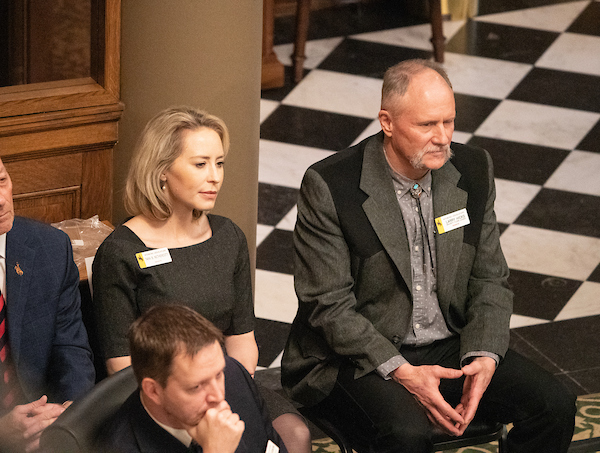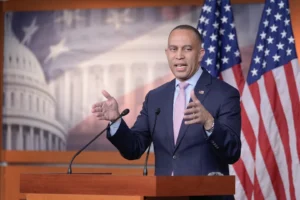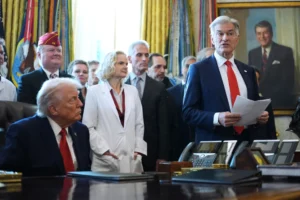Lawmaker Misconduct Under Scrutiny After Recent Incidents
Legislator Ethics subcommittee meets for first time to address bullying, aggressive behavior, social media posts
- Published In: Politics
- Last Updated: Jul 14, 2023

Sens. Tara Nethercott (R-Cheyenne) and Larry Hicks (R-Baggs) listen to Gov. Mark Gordon speak at a joint session of the 67th Legislature at the Wyoming State Capitol on Jan. 11, 2023 in Cheyenne. Nethercott is co-chairman of the Subcommittee on Legislator Ethics Complaint Procedure, which met virtually Thursday. (Photo by Michael Smith)

By Carrie Haderlie
Special to the Wyoming Truth
Wyoming lawmakers are reassessing a rule defining inappropriate behavior from an elected official, and when, how and if they should intervene.
Members of the Subcommittee on Legislator Ethics Complaint Procedure spent Thursday afternoon in a virtual meeting discussing Joint Rule 22-1, which covers “written, signed complaints from any person concerning misconduct involving legislative duties by a member of the House or Senate.”
First adopted in 2011, the joint rule was repealed by the Senate in January of this year. It remains in place in the House. This meeting comes on the heels of recent complaints against lawmakers, including a 2023 incident regarding a social media post by Rep. Karlee Provenza (D-Laramie) and 2022 allegations of “misconduct involving legislative duties” against Sen. Anthony Bouchard (R-Cheyenne).
Matt Obrecht, director of the Legislative Service Office, said he’s seen 10 individual incidents adjudicated or handled under the rule in 12 years. However, there is very little Wyoming leaders can do to discipline a member for behavior outside the session.
“I think a lot of members of the public come to this complaint process with expectations that leadership or management council has authority and power that it really doesn’t to regulate the behavior of members,” Obrecht said.
A moving target
Complaints against lawmakers have cited conflicts of interest, social media posts and intimidating behavior inside the capitol.
However, defining misconduct — and when lawmakers should be considered as acting in an official capacity, and when they are acting as private citizens — remains a moving target. League of Women Voters Representative Marguerite Herman noted during public comment that the rule does not hold elected officials accountable for behavior outside of the legislative session or on social media.
Cheyenne realtor Wendy Volk also gave public comment, saying she opted not to file a complaint against an unidentified lawmaker who she said “attacked” her on her personal Facebook page in August 2021. That conflict escalated to an in-person incident at a school board meeting and a subsequent police report.

“This particular senator was attacking me personally, questioning my status as a Republican for 40 years, and saying, ‘Why hadn’t the Republican Party done something to take me out’ sooner,” Volk said.
Seventy-eight other people began attacking Volk online, she said, and the next day at a school board meeting, one of those individuals personally threatened her.
“I had to file a police report. I received email threats, and it was all related to this one post,” Volk said. “I did not feel comfortable filing an ethics complaint when I looked at what our current rules are, because there wasn’t something I could cite: ‘Here is exactly the social media conduct.’”
Committee co-chairman Rep. Clark Stith (R-Rock Springs) asked whether rules governing a representative or senator’s conduct at a local school board meeting should “include a prohibition on rude or offensive behavior.”
“Or would you want to limit it to something like, advocating violence or the overthrow of the government?” Stith asked, later adding that the most basic form of relief comes during an election.
“If the legislator is engaging in that kind of outside-of-the-Legislature rude or offensive behavior, it seems to me the ballot box is where you remedy that,” he said. “Otherwise we become this behavior police that I don’t think the Legislature is well-suited to.”
Herman said she’d only want the rule to govern disciplinary action for behavior “outside of a difference in communication style.”
“It would be a fairly serious breach, I think,” she said. “I don’t want this to be, ‘I find him crude.’ It has to be more than that.”
Committee co-chairman Sen. Tara Nethercott (R-Cheyenne) said finding the line between what is appropriate and what is inappropriate will be “very difficult.”
“This is what we are trying to grapple with,” Nethercott said. “I also heard the words ‘bully’ and ‘intimidate.’ When you are in a position of perceived power, and you bully or you attack, or you chill free speech or people participating in public testimony, is that something we should consider?”
Sen. Chris Rothfuss (D-Laramie) also noted that in some states, ethics complaint procedures have become a measure of party loyalty.
“I think about other states that have taken action against members in recent months, where the votes ended up very much along party lines,” Rothfuss said. “Ethics became, ‘Do you agree with your party’s viewpoints: yes or no?’ And I think that is something we clearly want to avoid in an ethics rule.”
Parameters for discipline
The impetus for 2011 the rule was an ethics complaint filed against then-Rep. Sue Ellis in 2010, alleging the representative “improperly [used] her position as a state lawmaker to promote and misrepresent horse processing development from which she may personally benefit,” according to the Legislative Service Office.
In 2022, Eric Boley, president of the Wyoming Hospital Association, filed a complaint with the Senate against Bouchard for “misconduct involving legislative duties.” Bouchard was later stripped of his committee assignments during the 2022 session.
On April 12, Wyoming Speaker of the House Albert Sommers (R-Pinedale) formally responded to several signed complaints detailing social media posts by Provenza that occurred outside of a legislative session. The posts included a TikTok video showing “an older woman holding at her hip a scoped black rifle with an external magazine” and the message “Auntie Fa Says Protect Trans Folks Against Fascists & Bigots!”
In his letter, Sommers wrote that he “personally [found] Representative Provenza’s posts on social media to be inappropriate, uncivil conduct for a member of the Wyoming House of Representatives that reflects a discernable lack of judgment.” But he also did not believe they amounted to misconduct involving legislative duties actionable under the rule.
Nethercott directed LSO to draft rule changes that could include a proposed preamble letting the public know what is, and is not, within the disciplinary purview of the Legislature, as well as a provision for conflict of interest in the event those reviewing a complaint are involved in it.
The subcommittee will also continue discussing confidentiality issues during the complaint procedure.













